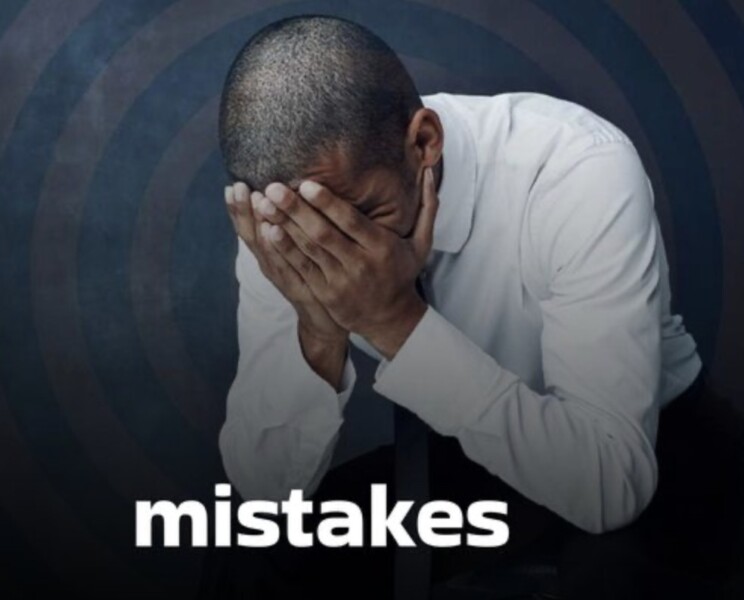By Nnaoke Ufere, PhD
As a fallible human being, I have made my fair share of mistakes. There were times when my blunders felt insurmountable, and I questioned my ability to recover from them. Whether it was in my academic years, job interviews, work, or family, I have felt the crushing weight of my mistakes. However, despite my shortcomings, I am willing to share my experiences to help others learn from them.
I acknowledge that I am still learning and often repeat the same mistakes, despite my best efforts to avoid them. Generally, my mistakes fall into two categories: commission, where I do something I shouldn’t have done, and omission, where I fail to do something I should have done.
One vivid example of commission occurred during my college years. I pulled an all-nighter studying for a final exam, only to wake up late because of an alarm clock that I had set incorrectly. I arrived late for the test and, despite being given the opportunity to take it alongside others, I ran out of time and failed to finish. The consequences of that mistake were severe, and I learned a valuable lesson about the importance of punctuality and contingency planning.
Another significant blunder occurred when I started my first job. I was required to have a valid driver’s license, but I didn’t have one at the time. In a rush to obtain it, I enrolled in a week-long crash course in Lagos and was issued a license without undergoing the necessary driving test. However, my lack of proper training soon became evident when I failed the driving test upon arriving in Paris for the job. This resulted in a frustrating four-week delay in my training school posting while I learned to drive properly. This experience taught me the importance of avoiding shortcuts and the potential for unintended consequences.
There are still more mistakes to share.
As an employee of an oil exploration company, I made a potentially life-threatening omission by getting lost in the vast Libyan desert for two days during a sandstorm. My mistake was that I left my compass back at the base camp. After this experience, I learned the importance of preparation and being equipped with the right tools for any task. It was a lesson that has stuck with me throughout my career, and I have always ensured that I have the necessary equipment and knowledge before undertaking any project.
In my role as an entrepreneur, I made another mistake by bringing two industry experts, who were also my friends, into my first company. Unfortunately, it was a bad fit, and our disagreements hindered our progress. We missed a critical Initial Public Offering (IPO) window before the tech bubble burst in 2000, reminding me that drinking buddies don’t always make the best business partners.
The cumulative effect of all these mistakes instilled in me a paralyzing fear of making mistakes, which is also known as perfectionism. This fear prevented me from taking novel risks because I was so afraid of making mistakes. This fear of making mistakes was a mistake in and of itself.
Compounding this issue is the pervasive societal conditioning to fear making mistakes. From a young age, we are often taught to hide our errors rather than learn from them, resulting in a fear of failure that can impede our personal growth.
Learning to Make Peace with Your Mistakes
As humans, we are bound to make mistakes. But it’s crucial to remember that fear of mistakes shouldn’t hold us back from pursuing our goals. We need to approach mistakes with an open mind and a willingness to understand why they happened and what we can learn from them. By doing so, we can transform our mistakes into valuable resource to improve our lives.
It’s essential to focus on the future, despite today’s mistakes. Learning from our mistakes and navigating the ebbs and flows of life’s turbulent waters without being paralyzed by fear is crucial. As someone who has made plenty of mistakes, I can assure you that any challenges you’re facing because of past mistakes will eventually fade into the past, and you will recover, but only if you learn from them, remain calm, persevere, invest your time and energy in your mission, and move forward into the future.
Remember, the feeling you get when you realize the consequences of a mistake won’t be around forever. Some mistakes and their outcomes are typically short-lived, so if you just let them pass, they will often resolve themselves quickly. But if you let them detain you, you run the greater risk of paralysis of regret and despair.
It’s important to acknowledge your mistakes, learn from them, and move on. It’s equally salient to recognize that some of life’s most valuable lessons can come from the hardest times and biggest mistakes. Beating yourself up for mistakes made is unproductive. Mistakes shouldn’t be viewed as a sign of failure, but rather as an opportunity for self-improvement and growth. Embracing mistakes as part of the learning process is essential for personal development.
So, let go of past mistakes and don’t dwell on them. Instead, use them as lessons to guide you in the future. As composer John Powell once said, “The only true mistake is one from which we learn nothing.” Therefore, it’s essential to reflect on your past mistakes and the lessons you have learned from them.
Tell me, what mistakes have you made, and what lessons have you learned from them? It’s important to approach this question with curiosity and openness, recognizing that mistakes are an integral part of the learning process.





Wonderful article.